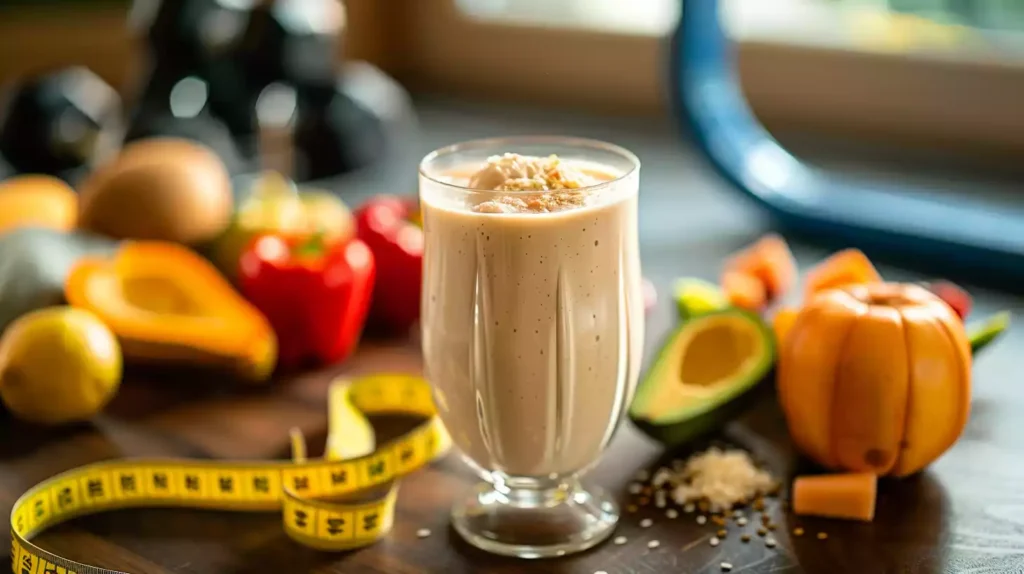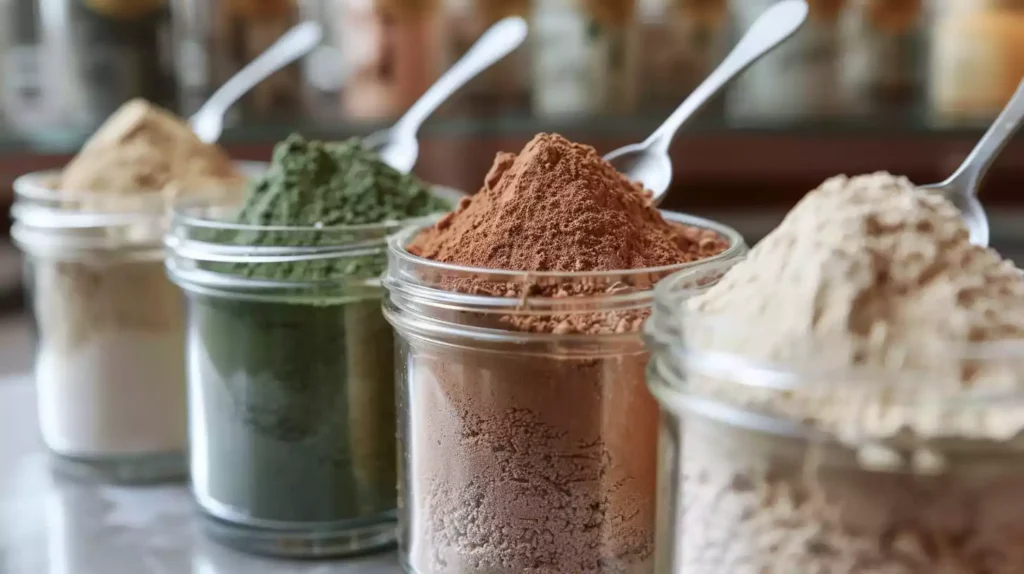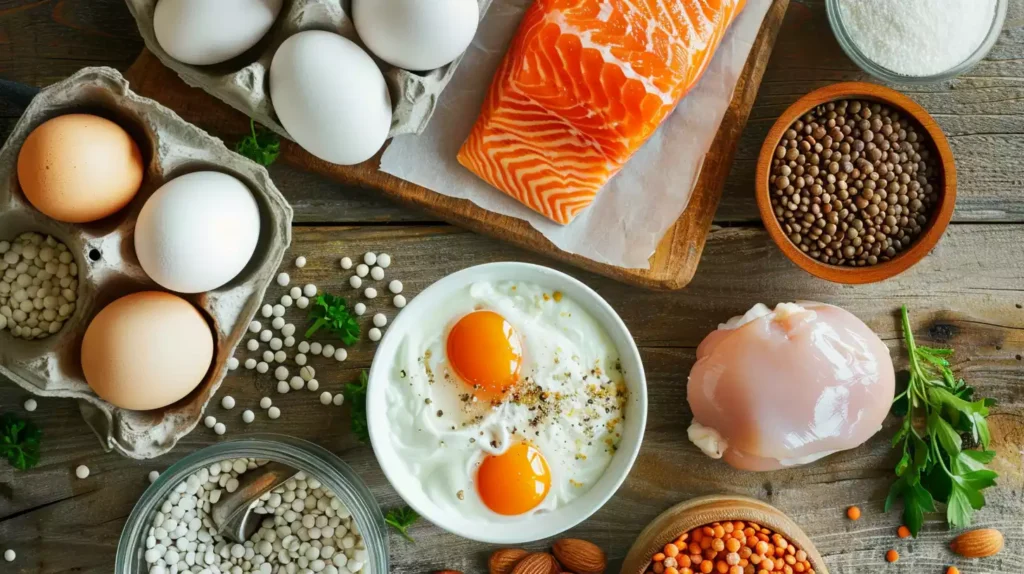Is Protein Powder Good for Weight Loss? (Debunking Myths)
Protein powder can be an effective tool for weight loss when used correctly. It helps control appetite, preserve muscle mass during calorie restriction, and slightly boost metabolic rate. By increasing feelings of fullness and impacting hunger-regulating hormones, protein powder can reduce overeating.
It also stabilizes blood sugar levels, preventing energy crashes. Various types are available, including whey, casein, and plant-based options, each with unique benefits.
However, it’s not a magic solution and works best when combined with a balanced diet and regular exercise. Proper usage, dosage, and understanding potential side effects are vital for maximizing its weight loss benefits.
Quick Summary
- Protein powder helps control appetite and increase feelings of fullness, reducing overall calorie intake.
- It preserves muscle mass during calorie restriction, maintaining a higher metabolic rate for weight loss.
- Protein powder has a high thermic effect, burning more calories during digestion than carbohydrates or fats.
- It stabilizes blood sugar levels, reducing energy crashes and cravings throughout the day.
- When combined with a balanced diet and exercise, protein powder can support weight loss goals effectively.
Understanding Protein Powder
In the wild world of nutritional supplements, protein powder is the rockstar that steals the show for those of us chasing our weight loss dreams. I mean, who wouldn’t want a concentrated dose of protein to fuel their fitness journey?
Derived from an array of sources – whey, casein, soy, pea, and hemp – each type brings its unique set of benefits and amino acid profiles to the table, catering to diverse dietary preferences and needs.
Let’s face it… as a busy bee, I need all the help I can get to meet my daily protein goals. That’s where protein powder saves the day! It’s designed to supplement our daily protein intake, which is crucial for maintaining muscle mass, supporting metabolism, and keeping those pesky hunger pangs at bay.
The best part? It’s typically low in carbs and fats, making it a low-calorie way to boost our protein consumption. Plus, it’s a breeze to mix with water, milk, or blend into smoothies and recipes – perfect for my on-the-go lifestyle.
But here’s the thing: when it comes to using protein powder for weight loss, we need to set our expectations straight. It’s not a magic bullet that’ll melt away those extra pounds overnight (if only, right?).
Instead, it’s a valuable tool that works best when paired with a balanced diet and regular exercise.
Think of it as the ultimate workout buddy! To get the most out of it, we need to choose a high-quality product that’s free from added sugars and unnecessary fillers. And, of course, it’s always a good idea to consult with a healthcare pro before adding it to our weight loss arsenal. And remember… Incorporating peanut butter into our diet can be a delicious and satisfying way to get the protein and healthy fats our bodies need. By choosing a high-quality, natural peanut butter, we can avoid added sugars and unnecessary fillers that may hinder our weight loss goals.
Benefits for Weight Loss
Protein powder offers several advantages for those aiming to lose weight.
It can help control appetite, preserve muscle mass during calorie restriction, and boost metabolic rate.
These benefits make protein powder a valuable tool in supporting weight loss efforts and achieving body composition goals.

Appetite Control
One of the most significant perks of protein powder for weight loss is appetite control!
I’ve struggled with portion control in the past, but since I started incorporating protein powder into my diet, I’ve noticed a significant difference. I’m not saying I don’t crave pizza anymore (because let’s be real, it’s the best), but I can definitely resist the temptation more easily.
Protein is like a superhero when it comes to increasing feelings of fullness and satiety.
It works its magic by impacting hormones that regulate hunger and satiety, such as ghrelin and peptide YY. This means that when you consume protein powder as part of a meal or as a snack, you’re less likely to overeat or grab those pesky midnight snacks.
Protein powder also helps stabilize blood sugar levels, which is a game-changer for those of us who experience energy crashes throughout the day.
You know, when you feel like you need a nap after lunch, but then you’re wide awake at 3 am? Yeah, protein powder can help regulate those wild blood sugar swings.
And let’s not forget about the thermic effect of protein – the energy required to digest and metabolize it is higher compared to carbohydrates and fats.
This means that protein powder can actually contribute to a slight increase in calorie burning, which is a nice little bonus when you’re trying to lose weight.
Many of my friends have found that incorporating protein powder into their diet, especially in the form of meal replacement shakes or pre-meal supplements, helps them stick to their calorie goals more easily.
It’s like having a trusty sidekick that helps you make healthier choices without feeling deprived.
So, if you’re struggling to control your appetite or stick to your diet, give protein powder a try!
It might just become your new BFF when it comes to weight loss.
Muscle Preservation
Losing weight can be tough, especially when you’re not sure if you’re losing fat or muscle.
I’ve been there, and trust me, it’s frustrating to see the numbers on the scale go down, only to realize you’ve lost precious muscle mass in the process.
But what if I told you there’s a way to tip the scales in your favor? Protein powder!! The ultimate game-changer for muscle preservation during weight loss.
When you’re on a calorie-restricted diet, your body is in a constant battle to decide what to burn first – fat or muscle.
And let’s be real, we want to lose the fat, not the muscle we’ve worked so hard to build.
That’s where protein powder comes in, providing a safety net for your muscles during weight loss.
So, how does protein powder work its magic?
For starters, it:
Boosts protein synthesis: I remember when I first started weightlifting, my coach told me to consume a protein shake within 30 minutes of my workout to stimulate muscle growth.
It worked like a charm! Similarly, when you’re on a calorie-restricted diet, consuming enough protein stimulates muscle protein synthesis, counteracting the breakdown that occurs during weight loss.
Improves nitrogen balance: A positive nitrogen balance is essential for maintaining muscle mass.
Think of it like a seesaw – when you consume enough protein, you’re tipping the balance in favor of muscle growth and preservation.
Enhances recovery: I’ve had my fair share of intense workouts, and let me tell you, recovery is key.
Protein powder supports faster muscle recovery, allowing you to push yourself harder and more frequently during a weight loss regimen.
Gives your metabolism a boost: Preserving muscle mass is crucial for maintaining a higher resting metabolic rate.
This means you’ll continue to burn fat even when you’re not actively working out. It’s like having your own personal fat-burning furnace!
Protein powder is the ultimate sidekick for anyone looking to lose weight while preserving muscle mass.
Increased Metabolic Rate
Let me tell you, it’s not just about getting those gains, it’s about revving up your metabolism to torch those extra calories. I remember when I first started my fitness journey, I was stuck in a rut, and my metabolism was slower than a sloth on a Sunday afternoon.
But once I incorporated protein powder into my daily routine, oh boy, it was like I had ignited a fire within!
So, what’s the secret behind protein powder’s metabolism-boosting powers? It all comes down to the thermic effect of food (TEF), which is the energy your body expends to digest and process the nutrients you consume.
And guess what?
Protein has a significantly higher TEF than carbohydrates and fats, meaning your body burns more calories digesting protein than other macronutrients! It’s like getting a free workout just from eating your protein shake!
Here’s a breakdown of how the different macronutrients stack up in terms of TEF:
| Macronutrient | TEF (% of calories) | Calories burned per 100g | Metabolic boost |
|---|---|---|---|
| Protein | 20-30% | 80-120 | High |
| Carbohydrates | 5-10% | 20-40 | Low |
| Fats | 0-3% | 0-12 | Minimal |
| Alcohol | 10-15% | 70-105 | Moderate |
But that’s not all! Protein powder can also help you maintain a higher metabolic rate by supporting lean muscle mass. I’ve seen it firsthand – when I’m consistent with my resistance training and protein intake, my muscles are more defined, and I feel like I can take on the day.
It’s because muscle tissue is metabolically active, meaning it requires more energy to maintain, which in turn boosts your resting metabolic rate. It’s like having a superpower that helps you burn more calories at rest!
Types of Protein Powders
The world of protein powders – where the fitness enthusiasts and health-conscious individuals unite!
As someone who’s been around the block a few times, I’ve tried my fair share of protein powders, and let me tell you, it can get overwhelming. But fear not, dear reader, for I’m about to break it down for you in a way that’s easy to digest (pun intended).
Protein powders come in various forms, each with its own unique nutritional profile and quirks. And, trust me, it’s essential to know the difference, especially if you’re looking to cater to specific dietary needs or preferences.

So, let’s get started with the most popular types of protein powders:
Whey protein: Ah, whey – my old friend! Derived from milk, it’s like the espresso of protein powders – fast, efficient, and packed with branched-chain amino acids (BCAAs). I remember when I first started working out, I’d drink a whey protein shake post-workout, and I could literally feel my muscles growing (or so I thought, haha!).
Casein protein: The slow and steady winner, also derived from milk, casein is like the bedtime story of protein powders. It’s slower to digest, providing a sustained release of amino acids that’ll keep you going throughout the night. I’ve had my fair share of casein shakes before bed, and let me tell you, it’s like a warm hug for your muscles.
Plant-based proteins: For all you vegans and vegetarians out there, don’t worry – I’ve got you covered! Plant-based proteins like pea, rice, hemp, and soy are the perfect alternatives. I’ve had friends who’ve made the switch to plant-based, and they swear by these protein powders. And, honestly, who can blame them? They’re just as effective, and you can feel good about saving the planet too!
Egg white protein: The new kid on the block, egg white protein is like the cool, edgy cousin of the protein world. It’s a complete protein source, easily digestible, and low in fat. I’ve recently started experimenting with egg white protein, and I must say, it’s been a game-changer for my fitness goals.
Each type of protein powder has its unique advantages.
Whey is perfect for those who want a quick muscle-building boost, while casein is ideal for a slow, sustained release. Plant-based proteins offer a guilt-free alternative, and egg white protein is the perfect choice for those seeking a dairy-free, animal-based protein.
Potential Side Effects
While protein powders can aid in weight loss, it’s important to be aware of potential side effects.
Some users may experience digestive system discomfort, such as bloating or gas, particularly when consuming large amounts.
There are also concerns about possible kidney strain from excessive protein intake, as well as risks of nutrient imbalances if protein powders replace a varied diet.
Digestive System Discomfort
Protein powders and tummy troubles are a common concern. As someone who’s experienced digestive system discomfort, I can attest that it’s a real issue when consuming protein powder.
While protein powders are generally safe, certain factors can contribute to gastrointestinal issues. Mild bloating or more severe symptoms like cramping or diarrhea can occur.
Several culprits can cause digestive woes:
- Lactose intolerance is one factor. If you’re lactose intolerant, whey and casein protein powders may not be suitable for you. Look for lactose-free alternatives instead.
- Artificial sweeteners like sucralose or aspartame can wreak havoc on the digestive system. If you’re sensitive to these sweeteners, you may experience discomfort.
- Consuming excessive protein in a short period can overwhelm the digestive system, leading to discomfort. Be cautious of high protein intake.
- Fiber content in plant-based protein powders, such as pea or brown rice, can cause bloating or gas. While fiber is beneficial, large quantities can be problematic.
To minimize digestive issues, choose a protein powder that suits your individual needs and tolerances. Start with small servings and gradually increase your intake while monitoring your body’s response.
If you experience persistent discomfort, consult a healthcare professional for personalized advice.
Kidney Strain Concerns
As someone who’s spent countless hours in the gym, I’ve always been concerned about the impact of protein powder on my kidneys. I mean, who isn’t, right? Those tiny organs work tirelessly to filter out toxins and waste, and the last thing I want to do is overload them with a protein shake-fueled burden.
The truth is, the kidneys do take on a significant amount of work when processing protein metabolites. And, excessive protein consumption can lead to an increased workload on these hardworking organs.
Now, I know what you’re thinking – ‘But I’m healthy, I can handle it!’ And, you’re right, healthy individuals can typically handle moderate increases in protein intake. However, if you’ve got pre-existing kidney conditions or are at risk for kidney disease, it’s time to pump the brakes.
I’ve got a buddy who’s a total gym rat, and he swears that his high-protein diet is the reason he’s constantly getting kidney stones. Now, I’m not saying it’s definitely the protein powder’s fault, but it’s definitely a contributing factor.
Research on this topic is all over the place, but one thing’s for sure – prolonged high protein intake can increase the risk of kidney stones and exacerbate existing kidney problems.
The scientific consensus is that protein intake within recommended levels is generally safe for those with healthy kidney function. Phew! That means I can still get my protein shake on, as long as I’m not overdoing it.
If you’re thinking of markedly increasing your protein intake through supplements, take a step back and consult a healthcare professional first. They’ll give you the lowdown on your individual health status and provide personalized recommendations.
And, don’t forget to drink plenty of water and balance that protein intake with other essential nutrients. Your kidneys will thank you!
Nutrient Imbalance Risks
Let’s face it, we’ve all been there – stuck in a protein powder frenzy, guzzling down shake after shake in the hopes of achieving those #gainz. But, trust me, been-there-done-that, and let me tell you, it’s not all it’s cracked up to be.
Consuming excessive amounts of protein powder can lead to nutrient imbalances, and I’m not just talking about a minor case of the grumps – we’re talking full-blown digestive issues, energy crashes, and a compromised immune system. Not exactly the health and wellness goals we’re aiming for, right?
When I first started taking protein powder, I was so focused on hitting my daily protein targets that I neglected other essential nutrients.
I mean, who needs veggies when you can have a protein shake, am I right? But, as time went on, I started to notice some not-so-fun side effects.
My digestive system was a mess, I was constantly tired, and my skin was looking duller than a winter morning. It wasn’t until I consulted with a registered dietitian that I realized I was creating an unbalanced diet by relying too heavily on protein supplements. Oops.
The risks associated with nutrient imbalances due to excessive protein powder consumption are real, folks!
- Reduced fiber intake, leading to digestive issues and constipation (been there, done that, and got the t-shirt – not fun).
- Inadequate carbohydrate consumption, potentially affecting energy levels and cognitive function (hello, brain fog!).
- Decreased intake of essential fatty acids, impacting heart health and hormone production (bye-bye, glowing skin!).
- Insufficient micronutrient absorption, compromising immune function and overall health (no thanks, cold and flu season!).
So, what’s the takeaway? It’s essential to maintain a balanced diet that includes a variety of whole foods alongside protein supplements.
I know, I know, it sounds obvious, but trust me, it’s easy to get caught up in the protein powder hype.
Proper Usage and Dosage
We’ve all been there… standing in front of the mirror, staring at our reflection, and wondering why those extra pounds just won’t budge.
First things first, you need to understand how much protein your body actually needs. Generally, adults should aim to consume 0.8 to 1 gram of protein per kilogram of body weight daily. But, if you’re like me and enjoy pushing yourself to the limit during those intense workout sessions, you may need to up that to 1.2 to 2 grams per kilogram.
Now, here’s the part where most people go wrong – they start relying on protein powder as a meal replacement instead of incorporating it into a balanced diet. Been there, done that, and let me tell you, it’s not the most effective way to lose weight.

Instead, use protein powder as a supplement to support your fitness goals. For example, I like to consume my protein powder within 30 minutes after exercise to help with muscle recovery and growth. And, if I’m feeling peckish between meals, I’ll whip up a quick protein smoothie to curb my hunger and maintain satiety.
When it comes to serving sizes, most protein powders recommend 20-30 grams per serving. You can mix it with water, milk, or add it to your favorite smoothie recipe.
Just remember, don’t overdo it! Excess protein can be stored as fat, and we’re trying to lose weight here, not gain it.
Always read those product labels carefully and consult with a healthcare professional or registered dietitian to determine the most appropriate dosage and usage for your individual needs and goals.
Combining With Exercise
Protein powder is amazing for weight loss, but it’s like having a superpower when you combine it with a solid exercise routine! I mean, who doesn’t want to boost their metabolism, build lean muscle, and torch those extra calories? I know I do!
The magic happens when you marry protein supplementation with physical activity.
When I started taking protein powder, I noticed a huge difference in my workout performance and recovery. But it wasn’t until I teamed it up with a consistent exercise routine that I saw real results.
Timing is everything! Consume that protein powder within 30 minutes after your sweat session to maximize muscle recovery and growth.
Mix it up! I’m a fan of combining resistance training with cardio for peak results. This dynamic duo helps build lean muscle mass while burning those unwanted calories. Trust me, it’s a game-changer.
Get your protein math right! Adjust your protein intake based on your exercise intensity and frequency. For me, that means aiming for 1.2-2.0 grams of protein per kilogram of body weight daily. It might take some trial and error, but it’s worth it.
Keep it balanced! Remember, protein powder is meant to complement a well-rounded diet, not replace it. Make sure you’re still getting those essential nutrients from whole foods. I like to think of it as a team effort – protein powder is the star player, but whole foods are the MVPs.
Alternatives to Protein Powder

I always thought protein powder was the only way to get my daily dose of protein. But, let me tell you, I was missing out on so much!
Whole food protein sources are not only more nutritious but also way more delicious. And the best part? You can easily incorporate them into your meals and snacks, offering variety and satiety.
With protein sources, you’ve got two main camps: animal-based and plant-based. Now, I’m not here to judge, but I’ve got to say, I’m a fan of both. Here’s a breakdown of some of my faves:
| Animal-Based Protein Sources | Plant-Based Protein Sources |
|---|---|
| Lean meats (chicken, turkey) – my go-to for a post-workout snack! | Legumes (lentils, beans) – so versatile and nutritious! |
| Fish (salmon, tuna) – packed with omega-3s! | Nuts and seeds – perfect for a quick energy boost! |
| Eggs – a staple in my breakfast routine! | Quinoa – a complete protein and fiber superstar! |
These whole food options can be just as effective for weight loss and muscle building as protein powder. Plus, they provide a range of essential amino acids, vitamins, and minerals that support overall health.
And let’s not forget about the thermic effect – your body burns more calories digesting whole foods compared to processed supplements!
When choosing protein sources, it’s essential to consider factors like dietary preferences, allergies, and individual nutritional needs.
For instance, if you’re lactose intolerant, you might want to opt for plant-based sources or lactose-free options. By incorporating a variety of protein-rich foods, you can ensure a well-rounded diet that supports your weight loss goals.
Long-Term Effectiveness
I once tried a protein powder that promised the world, but after the initial weight loss, I hit a plateau and eventually went back to my old habits. It’s a vicious cycle, and protein powder is no exception.
While protein powder may seem like a magic bullet for weight loss, its long-term effectiveness is a topic of hot debate among nutrition experts. Some studies suggest it can aid in weight loss and improve body composition, but the million-dollar question is: can it keep the weight off for good?
The truth is, that the effectiveness of protein powder for long-term weight management depends on various factors, including your metabolism, dietary habits, and exercise routines.
I’ve seen friends who swear by protein powder, but they’re also the ones who hit the gym five times a week and cook healthy meals every night. That’s not exactly a realistic scenario for most of us!
To separate the hype from the truth, let’s evaluate the long-term effectiveness of protein powder for weight loss:
Sustainability: Let’s be real, incorporating protein powder into our daily routine can get old fast. How many of us can honestly say we’ll stick to a protein shake for breakfast every morning for the rest of our lives? I know I won’t!
Nutrient diversity: Relying too heavily on protein powder can lead to nutrient deficiencies. I mean, who needs fiber and vitamins when you can have a quick protein fix, right? Wrong! Our bodies need a balanced diet, and protein powder shouldn’t replace whole foods.
Adaptability: Our bodies are smart, and they can adapt to increased protein intake. This means the initial weight loss benefits may wear off over time, leaving us back at square one.
Lifestyle factors: Let’s not forget that true weight loss success depends on making thorough lifestyle changes, not just relying on protein powder. I know it’s hard to hear, but there’s no shortcut to a healthy, balanced diet and regular exercise.






